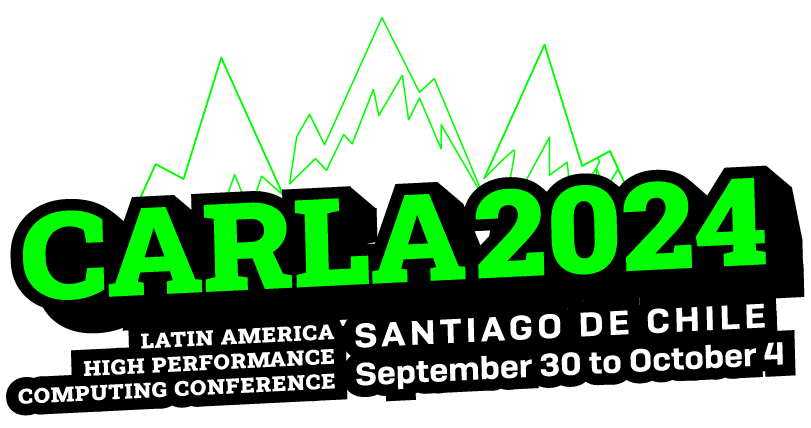In CARLA 2024 we will offer tutorials and hands-on workshops for both introductory and advanced levels, specially driven to undergraduate and master students all over Latin-American countries. There will be two periods: introductory tutorials will be covered on virtual format the week before the conference, while advanced tutorials will be held on the conference venue, the same week of CARLA 2024.
Tutorial proposal submission deadline:
July 31, 2024
Date of notification:
August 15, 2024
(Virtual) Fundamental Courses dates:
Sept. 23 – 27, 2024
(On site) Advanced Courses dates:
Sept. 30 to Oct. 4, 2024
Conference dates:
Sept. 30 to Oct. 4, 2024
Fundamental Courses
Professionals and researchers can propose courses and tutorials to be held the week before CARLA 2024, to cover basic and introductory topics on HPC areas.
Dates: September 23 – 27, 2024.
We plan to offer at least four courses on HPC Fundamentals. Topics could include:
- MPI
- OpenMP
- Introduction to GPU programming
- AI fundamentals R language, etc
Courses should be organized to be delivered in 2 to 4 sessions
- Each session (4 hours) to be organized as follows:
- 1 hour of pre-recorded material or on-line delivery: for students only
- 1 hour for individual offline study
- 2 hours of live guided “hands-on” practice
- Reference and support materials, available with free licenses
- Access to hardware and software platforms for each student
- Fundamental courses can be delivered in Spanish/Portuguese/English, but all the material must be available in English
Format for Fundamental courses
Each tutorial will have two or three sessions, according to the time needed by a specific topic. Also, each session will have two parts:
- A theory part: In this first part, the instructor uses recorded material such as videos, pdf documents and presentations, explaining workshop techniques and tools. All this material will be available in advance for students through the RedClara platform, using Moodle (https://moodle.redclara.net).
- A practical session: In this scheduled part, students will interact with instructors using live platforms, such as Zoom or Moodle chats and videoconferences. This part would last about 90 to 120 minutes, and students will solve practical exercises. Specific platforms (clusters, remote access, etc.) for each tutorial will be prepared in advance, depending on the topic and students’ registration.
In this way, each tutorial will cover from 8 to 16 hours long, with a minimum of four hours of practical (hands-on) work with instructor surveillance, totally online and prior to the main conference
Advanced Courses
Professionals and researchers can propose tutorials of different length, depending on specific topics. These are driven to advanced students with previous experience, to enhance academic/ research topics of interest.
Topics could include:
- HPC on the cloud.
- Mathematical modeling.
- Advanced tools for Data Analysis.
- Advanced GPU programming.
- AI specific tools and techniques, etc.
- Energy workshop specific tools and techniques, etc.
- HPC Management Workshop specific tools and techniques, etc.
- BioCarla Workshop specific tools and techniques, etc.
Dates: September 30 – October 4, 2024These tutorials are to be delivered on site and students will be invited to bring their own laptop.
Courses should be organized to be delivered in up to 4 sessions of 4 hours.
Each session must include at least 2 hours of live guided “hands-on” practice and offer students reference and support materials, available with free licenses, and access to hardware and software platforms for each student.
Advanced courses must be delivered in English and all the materials must be available in English.
Remarks
- Pre-recorded and reading materials will be available only for registered students, through the RedClara platform (https://moodle.redclara.net), during courses and the conference period. Once CARLA finishes after October 4, 2024, all material will be available for public use. Authors must agree in advance to allow public access to their materials.
- Pre-recorded lessons, videos and printed material must be in English. In the case of videos, it can be spoken in Spanish/Portuguese as far as English subtitles are provided (you should verify automatic online tools). Spanish and Portuguese subtitles for English spoken videos are desirable, but not mandatory.
- The authors must coordinate with CARLA staff the availability of hardware and software resources needed for tutorials. All resources must be available for registered students free of charge, including cluster accounts, Cloud resources, and other materials. Once the CARLA conference finishes, there is not any compromise to maintain those resources available.
Submission Guidelines
Tutorial proposals should be in English and should contain no more than three (3) pages in length.
Tutorial proposals should conform to the following outline:
- General information: Title of the tutorial. Organizers and Presenters names, affiliation, contact information, and brief bio. Language to be used.
- Abstract: one or two paragraphs suitable for inclusion in the conference registration material.
- Topic and relevance: A description of the tutorial topic, providing a sense of both the scope of the tutorial and depth within the scope, and a statement on why the tutorial is important and timely, how it is relevant to CARLA.
- Resources and Duration: Please indicate the number of sessions (4-hour each) to be delivered. Specify the equipment needs for participants (eg. pre-installed software) and if the organizers plan to give access to students to a particular platform.
- Audience: A description of the intended audience, prerequisite knowledge, and the expected learning outcomes. Tutorials typically have an audience of 12 ~ 20 students depending on facilities.
- Students’ prerequisites: Indicate if your tutorial needs previous knowledge or skills from students, for instance, administration knowledge on Linux, C++ knowledge, usage of MatLab, etc.
- Previous editions: If the tutorial was given before, where and when was it presented? Is there any novelty for this edition?
Once the tutorials are accepted, the Steering Committee will ask for specific information, in order to properly organize the resources, and provide to all the interested students the necessary information and resources needed to fulfill the tutorial.
Robinson Rivas (robinson.rivas@ciens.ucv.ve) and Cristóbal Navarro (cnavarro@inf.uach.cl)
